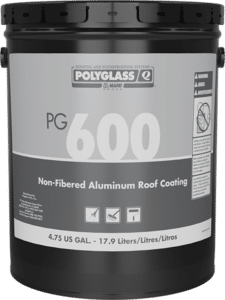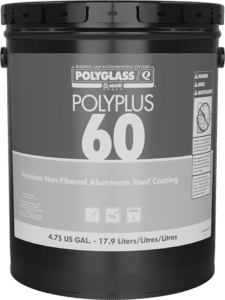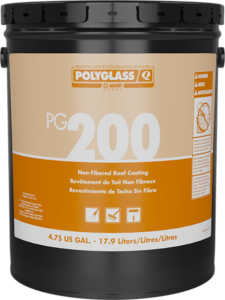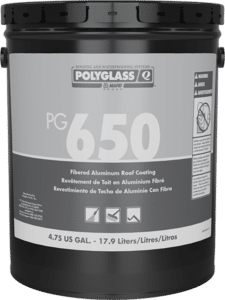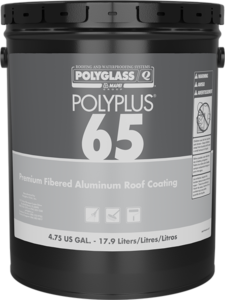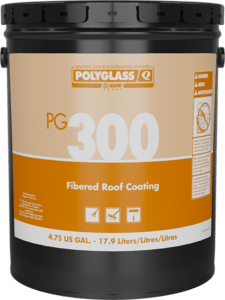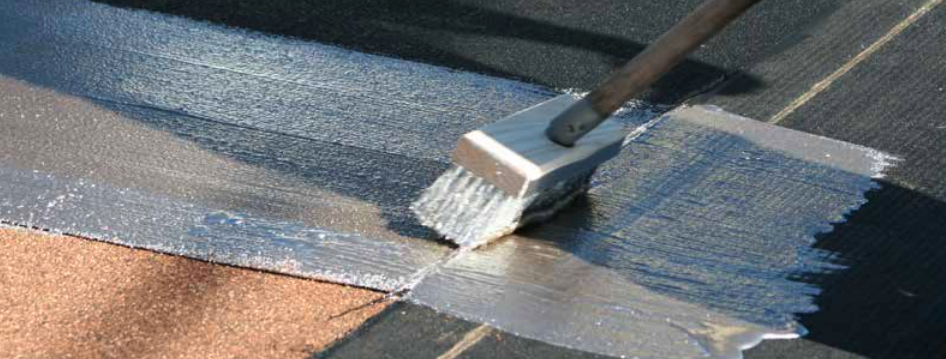
When choosing an asphaltic roof coating for a commercial roof system, one of the first things you need to decide is whether a fibered or non-fibered roof coating is most appropriate for your needs. While each coating has its advantages, one type is not necessarily better than the other. The best choice between fibered and non-fibered will depend on a variety of factors.
Let’s explore the difference between fibered vs. non-fibered roof coatings, and then explain how each is typically used, so you can make an informed decision on which product is best for you.
What is a Fibered Coating?
A fibered roof coating is infused with fibers (usually fiberglass) in addition to the basic materials used for the coating itself. These fibers can be very small in size or relatively large. The fibers are used to increase the strength of the roof coating and make it more resistant to tears and breaks. However, this strength comes at the expense of elasticity.
What is a Non-Fibered Coating?
As the name suggests, a non-fibered roof coating is a substance that does not include the infusion of fibers. Non-fibered coatings have more elasticity and stretching capability when cured, but they may not resist tears and abrasions as well as fibered coatings.
Which Type of Coating Works Best — Fibered or Non-Fibered?
The answer to this question truly depends on the intended application because both coatings have their uses. Factors that may play into your decision include the type of roof/substrate, the total surface area, and the climate and weather conditions to which the roof may be exposed.
As a basic rule of thumb, you’ll lean toward fibered coatings when your priority is strength and resistance against tears and abrasions, while non-fibered coatings work best for applications that require greater flexibility and the ability to stretch the material farther over a surface area.
A Breakdown of Polyglass Fibered vs. Non-Fibered Roof Coatings
Polyglass offers both fibered and non-fibered asphaltic roof coatings to cover a wide range of roofing needs and applications. The following overview lists some of these products and their most common uses.
Non-Fibered Coatings
- Polyglass PG 600 – This non-fibered aluminum coating is formulated to provide excellent UV protection and weathering characteristics over existing elastomeric roofs, asphalt BUR roofs and flashings, and most metal roof substrates. It is especially beneficial for use on asphalt because it is designed to be non-destructive to these surfaces.
- Polyglass PolyPlus® 60 – This coating is similar to the PG 600 and is used in similar applications, but it is a premium grade with greater durability and a longer lifecycle expectancy.
- Polyglass PG 200 – This non-fibered modified asphalt coating works well on a variety of roof types, but it specifically provides a protective surface for metal roofing, masonry, stucco, parapet walls, curbs, and base flashings. It can even serve as a damp-proofing compound for below-grade walls. This coating also works well as an adhesive for mineral granules and organic roll roofing membranes.
Fibered Coatings
- Polyglass PG 650 – The fibered version of PG 600, this aluminum coating provides similar UV protection and weathering characteristics to its non-fibered counterpart, but the fiber reinforcement serves to add durability and reflectivity.
- Polyglass PolyPlus® 65 – The premium version of PG 650, as well as the fibered counterpart to PolyPlus 60. Offers additional strength and longer-lasting reflectivity.
- Polyglass PG 300 – This is the fibered counterpart to PG 200. It works well on a variety of roof surfaces and can be used as an adhesive for mineral granules and organic roll membranes. Compared to PG 200, it offers greater strength and durability but it is less flexible, and therefore not as good a product for flashings, curbs, walls, etc.
Be sure to check out our black coatings line brochure for more complete information on Polyglass fibered and non-fibered roof coating products. For additional roofing knowledge and helpful resources, sign up for our newsletter below.

